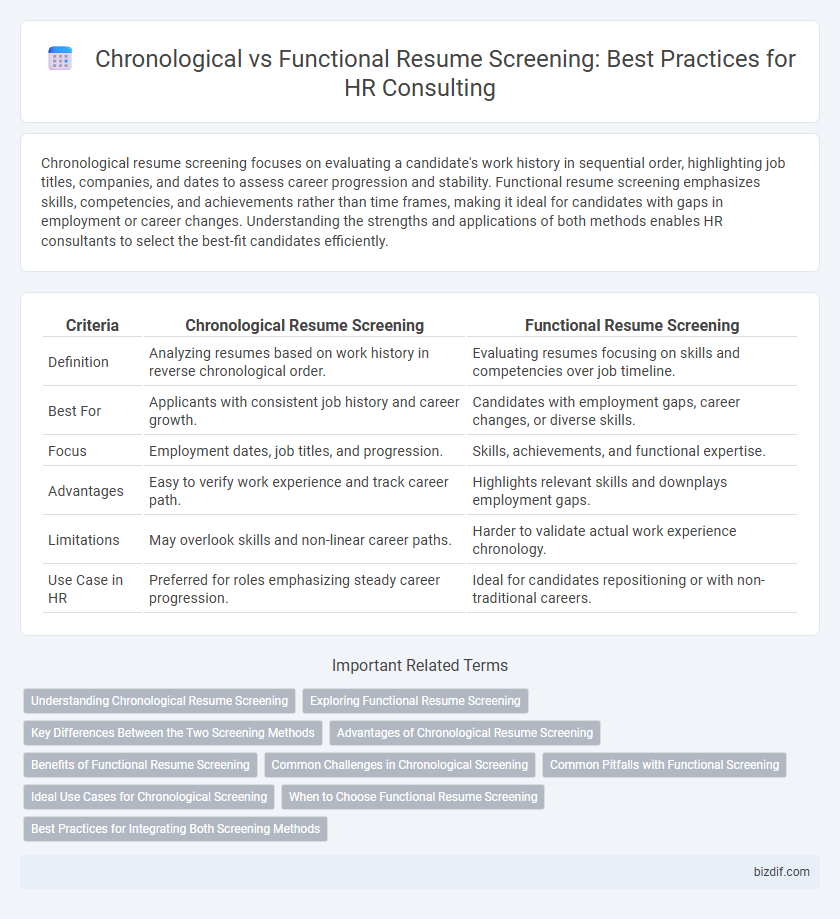Chronological resume screening focuses on evaluating a candidate's work history in sequential order, highlighting job titles, companies, and dates to assess career progression and stability. Functional resume screening emphasizes skills, competencies, and achievements rather than time frames, making it ideal for candidates with gaps in employment or career changes. Understanding the strengths and applications of both methods enables HR consultants to select the best-fit candidates efficiently.
Table of Comparison
| Criteria | Chronological Resume Screening | Functional Resume Screening |
|---|---|---|
| Definition | Analyzing resumes based on work history in reverse chronological order. | Evaluating resumes focusing on skills and competencies over job timeline. |
| Best For | Applicants with consistent job history and career growth. | Candidates with employment gaps, career changes, or diverse skills. |
| Focus | Employment dates, job titles, and progression. | Skills, achievements, and functional expertise. |
| Advantages | Easy to verify work experience and track career path. | Highlights relevant skills and downplays employment gaps. |
| Limitations | May overlook skills and non-linear career paths. | Harder to validate actual work experience chronology. |
| Use Case in HR | Preferred for roles emphasizing steady career progression. | Ideal for candidates repositioning or with non-traditional careers. |
Understanding Chronological Resume Screening
Chronological resume screening evaluates candidates based on their work history presented in reverse chronological order, highlighting career progression and stability. This method helps HR consultants identify consistent employment patterns, relevant job titles, and recent experience directly related to the position. Emphasizing dates and job sequence allows recruiters to quickly assess a candidate's career trajectory and potential fit within the company's timeline requirements.
Exploring Functional Resume Screening
Functional resume screening prioritizes candidates' skills and competencies over their chronological work history, making it ideal for assessing career changers or professionals with employment gaps. This method highlights relevant abilities by categorizing experiences under skill-based headings, allowing HR consultants to identify key qualifications more efficiently. Functional resume screening enhances talent acquisition by focusing on competency alignment rather than date-driven job progression.
Key Differences Between the Two Screening Methods
Chronological resume screening emphasizes evaluating candidates based on their work history arranged by date, highlighting career progression and stability. Functional resume screening focuses on assessing skills and competencies regardless of employment timeline, prioritizing relevant abilities over job tenure. Key differences lie in chronological screening valuing experience continuity, while functional screening targets specific skill sets and achievements.
Advantages of Chronological Resume Screening
Chronological resume screening highlights a candidate's consistent work history and career progression, making it easier for HR consultants to assess employment stability and relevant experience. This method provides clear timelines that help identify gaps in employment and correlate skills with specific job roles. Employers often prefer chronological resumes as they simplify the evaluation process by showcasing a straightforward, time-based narrative of professional achievements.
Benefits of Functional Resume Screening
Functional resume screening highlights candidates' skills and relevant experience, enabling HR consultants to identify talent with specific competencies rather than focusing solely on job history gaps or dates. This method benefits organizations by uncovering transferable skills and adaptability, enhancing the match between candidate capabilities and job requirements. Additionally, functional screening supports diversity and inclusion efforts by reducing bias towards traditional career paths.
Common Challenges in Chronological Screening
Chronological resume screening often struggles with gaps in employment and diverse job transitions, making it challenging to assess a candidate's consistent career progression. Recruiters may overlook transferable skills when strictly adhering to employment dates, leading to potential biases against unconventional career paths. This approach can also complicate the identification of relevant qualifications, especially for candidates with non-linear work histories or career breaks.
Common Pitfalls with Functional Screening
Functional resume screening often overlooks chronological work history, which may result in missing crucial employment gaps or job stability issues. Recruiters risk misinterpreting skill clusters without understanding the context of career progression, leading to potential mismatches in candidate suitability. This approach can also inadvertently raise red flags for applicants by obscuring clear timelines, causing unnecessary skepticism during hiring decisions.
Ideal Use Cases for Chronological Screening
Chronological resume screening is ideal for candidates with a consistent work history and clear career progression in relevant fields, making it easier to assess stability and growth. This method works best for industries valuing tenure and experience depth, such as healthcare, finance, and engineering. Employers seeking to verify employment dates and straightforward job roles benefit significantly from chronological screening to quickly identify suitable applicants.
When to Choose Functional Resume Screening
Functional resume screening is ideal when candidates have gaps in employment, frequent job changes, or are transitioning to a new career field. This method emphasizes skills and competencies over specific job history, making it easier to identify relevant expertise for roles requiring adaptability. Employers seeking to evaluate potential beyond chronological experience benefit from focusing on functional resumes during recruitment.
Best Practices for Integrating Both Screening Methods
Integrating chronological and functional resume screening optimizes candidate evaluation by combining the timeline clarity of work experience with skill-based competencies. HR consultants should structure initial screenings using chronological resumes to verify career progression and stability, followed by functional resume reviews to assess relevant skills and accomplishments tailored to the job requirements. Employing applicant tracking systems (ATS) configured to parse both formats ensures comprehensive analysis and improves candidate matching accuracy.
Chronological Resume Screening vs Functional Resume Screening Infographic

 bizdif.com
bizdif.com